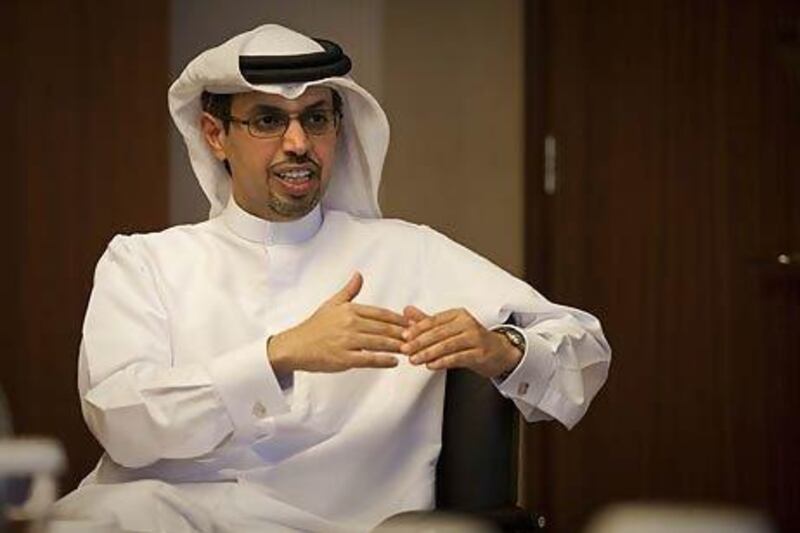Small and medium businesses in Dubai are the most positive they have been in five years amid a resurgence of the emirate's commerce, tourism and property sectors helped by its bid to host Expo 2020 and plans to become a hub for Islamic finance, the Dubai Chamber of Commerce and Industry said.
In a recent survey, the chamber found that 73 per cent of its 150,000 members - 95 per cent of which are SMEs - expected business to stay the same or improve in the third quarter.
The survey found that SMEs were more optimistic than larger businesses, with 27 per cent expecting an improvement, compared with 21 per cent of the bigger players.
"We are in a very positive time," said Hamad Buamim, the director general of the Dubai Chamber, noting that exports in the seven months until the end of July had risen 7 per cent compared with the same period a year ago, that the property market had grown at a double-digit pace so far this year and that hotels were enjoying an 80 per cent plus occupancy rate.
"That's the highest for five years," he added.
A total of 8,000 companies also joined the chamber in the first half of this year compared to 7,000 new members in the January-July period of 2012. This suggests that more start-ups were being created, he said. Mr Buamim said the Chamber expects as many as 12,000 new members by the end of the year.
Looking beyond 2013, Mr Buamim identified two other reasons SMEs have to be optimistic: Dubai's bid for the World Expo 2020 and the UAE's goal of becoming the global centre for Islamic finance.
Dubai is considered a front-runner in the bidding for the expo. The winner will be announced in November.
"Whether we win or not the Government has plans to develop that part of Dubai," he said referring to the Dubai Trade Centre-Jebel Ali site, which is equidistant between Dubai and Abu Dhabi cities. "No matter what happens, this is driving business activities in Dubai towards something more medium term."
Opportunities will also arise for SMEs as the UAE pushes to become the world centre of Islamic finance. The chamber announced last week that it would hold a Global Islamic Economy Summit in November.
SME development is one of six areas of the $4 trillion Islamic economy that the summit will address.
Working towards becoming a global Islamic economy capital "will provide huge opportunities for multinationals and for local businesses whether big or small," Mr Buamim said. "We will be [examining] some of the success stories from other countries such as Malaysia and Turkey [especially those relating to] SMEs and what they did to benefit from such ideas. This is the first time we are doing this and we expect to learn lot from it."
Mr Buamim said that while many people immediately associate the Islamic economy with financial products such as takaful insurance and sukuk bonds, there were many opportunities beyond that in the services, lifestyle and food sectors.
The momentum in the Islamic finance sector would continue through next year when the World Economic Islamic Forum came to Dubai towards the end of the 2014.
Mr Buamim said that while the costs of starting a business in Dubai were relatively low - something not all entrepreneurs would agree with - he acknowledged that businesses still had difficulties in accessing financing. Currently, less than 5 per cent of bank lending in the UAE goes to the SME sector even though it contributes at least 30 to 35 per cent of the country's overall GDP.
The majority of banks consulted by a task force on SME financing convened last year said they would like to increase lending to SMEs to 15 per cent but often SMEs were not able to provide the financial statements they required.
The chamber is helping to address this partly through its Tejar Dubai scheme announced in May. As part of the Entrepreneur Development Programme, budding Emirati entrepreneurs will be mentored intensively by veteran business experts as they develop their ideas into viable businesses. One of the hoped-for outcomes is that if the six-person panel - which includes Abdulfattah Sharaf, the chief executive of HSBC Middle East, and Vijay Malhotra the chief executive of KPMG Lower Gulf - endorses the individual's business plan, this will help him or her to tap into bank funding.
"Nowadays the financial system is really full of money and cash and [banks] are looking for the right opportunities," said Mr Buamim. "We strongly believe as as chamber of commerce that SMEs offer big opportunities."





